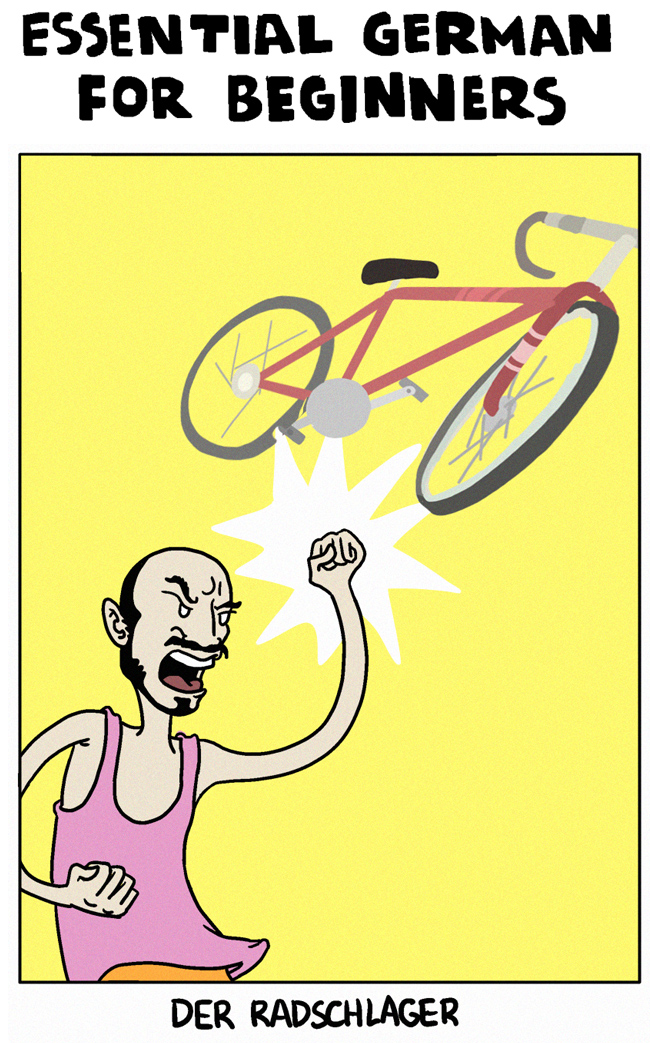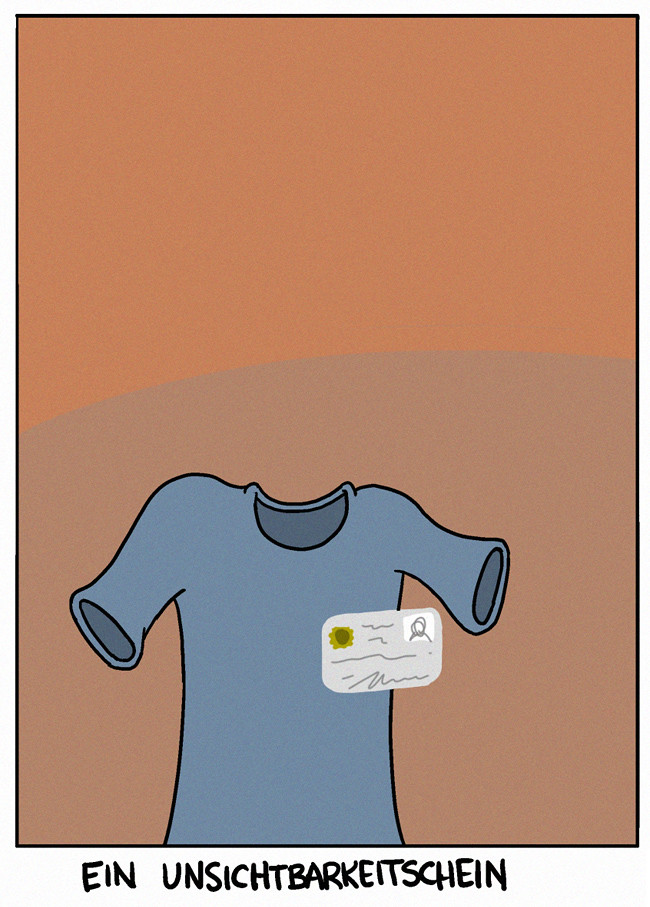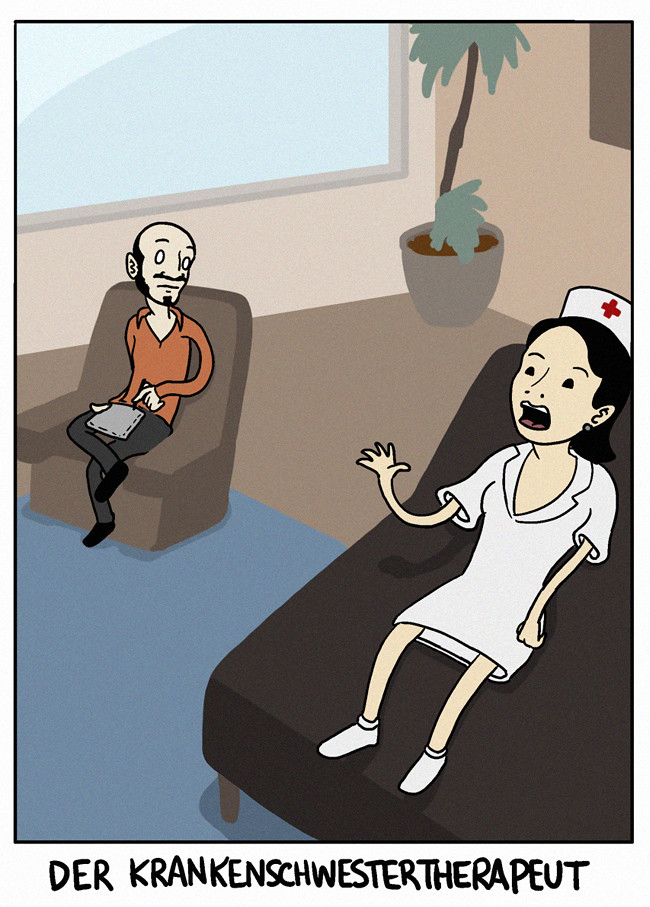The Hilarity of Compounds
by James Glazebrook

The German language is many things. A black hole of grammatical fun. Stubborn. Occasionally unyielding. Full of barbed traps lying under piles of dry leaves waiting to snap your juicy little leg between its genitive teeth. Possessed of absolutely no logic when it comes to assigning any of its three genders to nouns. The subject of one of Mark Twain’s most glorious ruminations.
Surely there is not another language that is so slipshod and systemless, and so slippery and elusive to the grasp. One is washed about in it, hither and thither, in the most helpless way; and when at last he thinks he has captured a rule which offers firm ground to take a rest on amid the general rage and turmoil of the ten parts of speech, he turns over the page and reads, “Let the pupil make careful note of the following exceptions.” He runs his eye down and finds that there are more exceptions to the rule than instances of it. So overboard he goes again, to hunt for another Ararat and find another quicksand.
Perhaps because learning German is such a trial, indeed a lifetime commitment for the poor Germans, many of whom get their die/der/das wrong well into adulthood and presumably for evermore, it has a few elements that prevent it from being entirely torturous, that, in fact make it rather fun. German has excellent words. Words that are gratifyingly onomatopoeic, words that are so cute you want to put them in your pocket and pull them out every now and then to sigh at.
I personally derive a great deal of pleasure from the ‘S’ section of the dictionary. Almost all my favourite German words start with ‘sch’, Schnabel (beak) being the most notable. And Schnuller (a baby’s dummy), schnuller is amazing. And schmusen (to snuggle and cuddle).

But the subset of words that probably receive the greatest amount of my attention (when I should be focusing on sentence structure and plurals and articles) would have to be the endlessly wonderful compounds. No one compounds like the Germans. Oh yeah, sure, English is full of them but they aren’t particularly special. They are run of the mill compounds that pale in comparison to the ones the Germans have come up with. And I am not talking about the annoyingly long words like the one they have for ‘the hat a captain wears on a special type of boat when it is Monday and raining and he feels like eating calamari.’ I am talking about the unassuming cases when the economy of the German mentality has stretched to include simply sticking two words together to create a new one and in doing so creating a splendid (or quite horrible) visual effect.
Some words are completely logical; someone has quite literally looked at the main components of an object and stuck the two words for those components together. Oh, look, an animal (tier) that’s main feature is its bad smell (stink). Let’s call it a Stinktier (skunk). Other words are slightly less appealing, or indeed transparent, like the word for nipple – Brustwarze – which literally translates to breast wart. Why give that mother’s-milk giving teat a new name when you can simply liken it to a wart on one’s boob?
Most of my favourite compounds involve animal names which are as cute as they are funny. In fact, apart from their occasional foray into breast wart territory and unfortunate mishaps like Dudelsack (bagpipes) Germans have cornered the market on cute words. This is the language that produced Morgenmuffel to describe someone who is always rumpled and sleepy in the morning. Hell, they gave us a garden of children as the place where school life begins. Germans do cute like they do literal – with utmost ease.

So without further ado, here are my favourite German compounds with direct English translations. Admittedly giving them direct English translations is probably unfair but it’s also where 100% of the fun lies. Enjoy. And please, give me more.
Animals
- Aardvark = Erdferkel = Earth Piglet
- Ape = Menschenaffe = Human Monkey
- Guinea Pig = Meerschweinchen = Little Ocean Pig
- Newt = Wassermolch = Water Salamander
- Porcupine = Stachelschwein = Sting Pig
- Platypus = Schnabeltier = Beak Animal
- Racoon = Waschbär = Wash Bear
- Seal = Seehund = Sea/Lake Dog
- Squid = Tintenfisch = Ink Fish
- Tortoise = Schildkröte = Shield/Sign Toad
Other Classics
- When something is wrapped in bacon, then it is wearing a Speckmantel = bacon coat. Obviously.
- The fat on your hips is Hüftgold = hip gold.
- A light bulb? It glows and it is shaped like a pear, so why not Glühbirne?
- Are you a treat lover? What about a Naschkatze … a treat cat?
- Happy about something? Why not perform a little dance of joy, or a Freudentanz?
- It’s NYE, perhaps you have cracked out the sparklers, but in Deutschland you’ll be lighting up a Wunderkerze, a wonder candle.
- Regularly unlucky? Then you are a Pechvogel, or a bad luck bird. If, on the other hand, you’re a lucky little devil, in German you are a Glückspilz – a lucky mushroom. (Mushrooms and pigs are about as lucky as you can get here, if you aren’t a lucky mushroom you better hope you’re a Glücksschwein. Or that you Schwein haben … have a pig …)
- A drug is a Rauschgift, or a toxic trip.
- That horrible embarrassment you feel on behalf of someone else? Fremdscham … foreign shame.
- The spread for your breakfast bread that consists of strips of ham and pickle in a creamy mayonnaise? Fleischsalat. Meat salad.
There are more, so many more, but die Zeit läuft (the time runs) and I must einen Schuh machen (make a shoe … don’t ask). Feel free to share your favourites in the comments below.




Gotta love the word for percussion: Schlagzeug (hit stuff)
Cracking up.. and don’t forget the Eier-legende-Wollmilchsau!
How could we forget this beauty? http://projektmanagement.files.wordpress.com/2006/12/eierlegendewollmilchsau.jpg
I will never get over Gums: Zahnfleisch : Tooth Meat!
Ohrwurm = “ear worm” for a song stuck in your head.
Also compound city names can be very graphic: Darmstadt = “Intestine City”.
Also Bruchpilot, the classics Drecksack and Mistfratze, and a Berlin special: Nachtjacke.
And in typical ‘deutscher Manier’ I found a typo above: it should be ‘Glückspilz’ instead of ‘Glückpilz’. ????
Thanks for that – you’ll be happy to see I’ve corrected this now
Rübennase, Feuerteufel, Eselsbrücke, Brillenschlange, Bürohengst, Saftschubse, Spaßvogel, Lausbub, Einhandhebelmischer and my favourite of useless mathematics: Doppelhaushälfte.
The Seehund (or the also known Seelöwe) I’d definitely call sea hound or sea lion, not lake, as it is from die See (sea), not der See (lake), and it’s definitely a shield toat (der Schild = shield, das Schild = traffic or door sign).
…and to give you some more: Vollpfosten, Frühaufsteher, Schleckermaul, Dumpfbacke, Schnellmerker, Warmduscher, Schnapsdrossel, Dreckspatz, und der Donaudampfschiffahrtsgeselschaftskapitän
Animals: Faultier, Eichhörnchen, Warzenschwein, Stachelschwein…
Not to forget: Strohwitwe, Bettnässer, Nervensäge, Silberfischchen, Achterbahn
So funny… Hope you made uo the illustrated words, cause I never ever heard of them.
Some more compounds (things): Fahrschein, Stricknadel, Durstlöscher, Rasierapparat, Blumenampel, Doppelstockbett, Turnbeutel, Kachelofen
(people) Dumpfbacke, Nachtschwärmer, Trantute, Quatschkopf, Miesepeter, Traumtänzer, Dummquatscher, Langschläfer
My all time favourite: Kulturbeutel.
What we Germans think of culture is simply cosmetics… On the other hand it sounds better than toilet bag…
Blitzmerker, Mutterkuchen, Scheibenkleister, Klugscheißer, Schluckspecht, Windhose, Ministerialdirigent, Backfisch..
some more: Rotzlöffel, Quasselstrippe, Tratschtante and two more beginning with “sch” Scherzkeks, Schlaumeier
I’ve heard Quasselstrippe before, but not the others. Thanks!